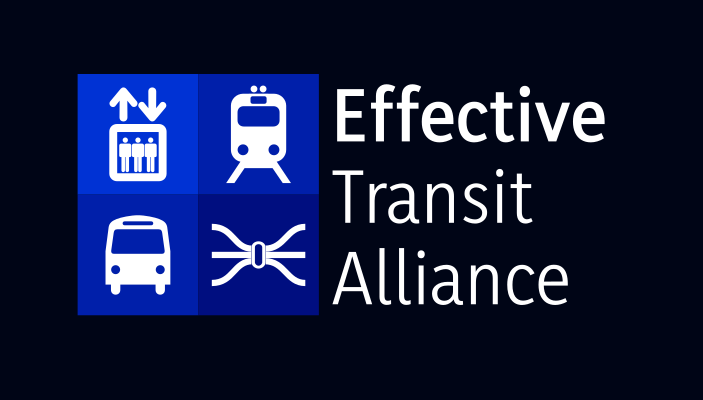Congestion Pricing Must Start On Time
A map of the Congestion Pricing zone (Source: MTA)
Like everyone else in the New York region, the Effective Transit Alliance was blindsided by New York State Governor Kathy Hochul’s inexplicable and senseless decision to indefinitely delay congestion pricing. Should it stand, this decision will be a catastrophe for New York. ETA urges everyone involved in New York transit to work to reverse this decision and begin congestion pricing on the date it was scheduled to begin, June 30, 2024.
In one day, Hochul sniped 17 years of effort and five years of state capital budgeting. After 4,000 pages of environmental review designed to beat aggressive litigation, the state concluded congestion pricing is clearly in the public interest, for all of the following reasons:
Faster buses: in London, the congestion charge led to a 7% gain in bus speeds within the tolled zone and a 2% gain near it, raising bus ridership into city center by 18%
Less congestion for the truly necessary car trips, which would be sped up like the buses; sensitive deliveries will pay the extra $15 to get there faster, and emergency traffic and disabled drivers have exemptions
What’s more, unlike most programs to improve city transportation and air quality, congestion pricing generates revenue rather than consuming it. As a result, going back to 2019, state budgeting for transit improvements has counted on extensive revenues from the program, by law at least $1 billion a year. The MTA has leveraged this through bonding, to the point that $15 billion out of the $52 billion 2020-4 capital plan has been funded through future congestion pricing revenue; without congestion pricing, the MTA will not be able to bond again, certainly not if a temporary rather than permanent solution is used, like raiding the rainy day fund—and a permanent payroll tax has been rejected by the legislature already.
This move puts the entire MTA capital plan in jeopardy. Key improvements like subway station accessibility and Second Avenue Subway Phase 2 rely on congestion pricing revenue. The majority of the subway is not accessible to disabled people; for decades, the MTA has argued that the system’s legacy makes it hard to comply with the ADA, and a consent decree from 2022 requires the MTA to retrofit stations at a pre-agreed rate, for which significant congestion pricing money has been earmarked. For Second Avenue Subway, the cancellation may trigger an avalanche of funding cuts, since the project has $3.4 billion in federal funding that congestion pricing proceeds are supposed to match; national transit activists believe that the FTA may rescind the money if congestion pricing does not go into effect, and be more hesitant awarding the MTA and other NY state projects money in the future.
The worst thing about Hochul’s cancellation is how abrupt it was. The MTA board was not briefed in advance. MTA head Janno Lieber only found out two hours before the public announcement. The MTA has already contracted for $556 million to install and maintain tolling infrastructure, such as flash-free cameras and EZ-Pass readers, whose fate is now unclear. The message this sends to everyone involved in public transit in New York is, “Don’t bother, because the governor may cancel your work without notice.” Contractors have long considered the MTA a difficult client and demanded payments in advance due to risk, including policy risk; passionate workers who want to make the city better have long known that they’d be unappreciated in the public sector due to such behavior by the executives and most who can end up leaving for the private sector.
In this way, Hochul must be compared with both her predecessor, Andrew Cuomo, and the former governor of New Jersey, Chris Christie. Both had habits of making last-minute decisions over the plans of their own state employees, for capricious or even vindictive reasons. Indeed, it is not even clear that the governor has the legal authority to unilaterally end congestion pricing, as the entire program not only authorizes the MTA to collect revenue, but requires them to collect a certain amount of funding per year. This is the exact reason that the MTA is ostensibly an independent organization: to be free from overt political interference.
In this moment of self-inflicted crisis, ETA calls upon all who serve the people of New York to ensure that congestion pricing begins as planned. State legislators should stand firm to the law they have passed, and MTA board members must consider their civic duty as well as their fiduciary responsibility to the organization they oversee.
For more information on how individuals can help, please see this page from our friends at the Tri-State Transportation Campaign, this page from our friends at Riders Alliance, or this page from our friends at Transportation Alternatives.

